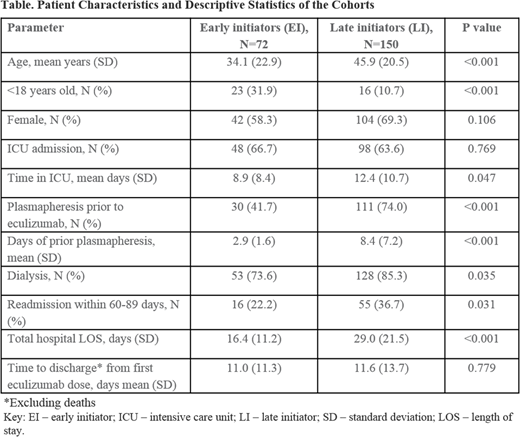Abstract
BACKGROUND: Atypical hemolytic uremic syndrome (aHUS) is a rare, genetic, potentially life-threatening disease often requiring hospital or intensive care unit (ICU) admission. Previously outcomes were poor with 56% of adults progressing to end-stage renal disease or death within one year of disease onset, regardless of plasma exchange/plasma infusion. Eculizumab (Soliris®, Alexion Pharmaceuticals, Inc., New Haven, CT, USA), a monoclonal antibody directed against complement C5, is the only approved treatment for aHUS. It has demonstrated significant improvement in clinical outcomes, including rescue or preservation of renal function, particularly with early initiation. However, difficulty in the differential diagnosis of aHUS has contributed to significant delays in instituting effective therapy. We hypothesize that patients initiating treatment on Day 8 of their hospital stay or later [late initiators (LI)] consume more inpatient resources and have greater hospital costs compared to those that initiate therapy earlier [early initiators (EI)].
OBJECTIVE: To evaluate the impact of early versus late initiation of eculizumab treatment for patients with aHUS admitted to a hospital.
METHODS: Patients with an inpatient hospitalization in the Premier Perspective® Hospital Database (Oct 2011 - March 2016) with a diagnosis code for hemolytic uremic syndrome (HUS) and/or thrombotic microangiopathy (TMA) (International Classification of Diseases, Clinical Modification 9th Revision [ICD-9-CM]: 283.11 or 10th Revision [ICD-9-CM]: D59.3 and ICD-9-CM 446.6/ICD-10-CM M31.1, respectively), and evidence of eculizumab use for aHUS during the hospitalization were included. Patients who had eculizumab use in the hospital outpatient setting within the preceding 6 months were excluded from the analysis. Patients were further validated as aHUS by an expert clinician prior to inclusion in the analysis. EI were defined as having received eculizumab within 7 days of admission; LI received eculizumab on Day 8 or later. Cutoff at 8 days was chosen due to time it takes in general to receive results of an ADAMTS13 activity test, which is used to distinguish between thrombotic thrombocytopenic purpura and other TMAs. The primary outcome measures were discharge status, days in intensive care unit (ICU), time from initiation to discharge, readmission rates, dialysis use, and total hospital costs. Multivariable regression (logit and log-linear gamma) models were fit to the data to control for potential confounding variables like patient demographics and comorbid conditions.
RESULTS: A total of 150 (67.6%) LI and 72 (32.4%) EI were identified. Patient characteristics and descriptive statistics of the cohorts are shown in the Table. LI were older and a lower proportion were <18 years of age. While a similar proportion of patients were admitted to ICU, LI spent longer in the ICU. Although the number of days to live discharge from eculizumab initiation was similar between groups, the total hospital length of stay (LOS) for LI was much greater versus EI. Significantly more LI than EI received dialysis and were readmitted within 90 days of initial hospitalization. Multivariable regression analyses demonstrated significant differences in dialysis use and hospital costs in the LI versus EI groups. LI had 3.2 (OR 1.4, 7.3) times the odds of receiving dialysis during hospitalization (versus EI) and had estimated total hospital costs (least squares mean) that were $17,781 higher ($103,557 versus $85,776).
CONCLUSIONS: Late initiation of eculizumab in patients with aHUS results in greater resource utilization and higher hospital costs than those for early initiators of treatment. This suggests that processes should be implemented to expedite results of required lab tests such as ADAMTS13 activity test, for rapid differential diagnosis of aHUS to institute timely and appropriate treatment.
This study was funded by Alexion Pharmaceuticals Inc.
Donato:Alexion Pharmaceuticals Inc: Employment, Equity Ownership. Ryan:2CTI Clinical Trial and Consulting: Consultancy, Other: I am an employee of 2CTI Clinical Trial and Consulting Services Inc. who is a consultant for Alexion. Irish:2CTI Clinical Trial and Consulting Services: Consultancy, Other: During this study, I was an employee of 2CTI Clinical Trial and Consulting Services Inc. who is a consultant for Alexion. Gasteyger:Alexion Pharma GmbH: Employment, Equity Ownership. L'Italien:Alexion Pharmaceuticals, Inc.: Equity Ownership, Other: Former employee and current stockholder of Alexion Pharmaceuticals, Inc. . Laurence:Alexion Pharmaceuticals Inc: Consultancy.
Author notes
Asterisk with author names denotes non-ASH members.


This feature is available to Subscribers Only
Sign In or Create an Account Close Modal